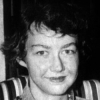Flannery O'Connor

Flannery O'Connor
Mary Flannery O'Connorwas an American writer and essayist. An important voice in American literature, she wrote two novels and 32 short stories, as well as a number of reviews and commentaries. She was a Southern writer who often wrote in a Southern Gothic style and relied heavily on regional settings and grotesque characters. Her writing also reflected her own Roman Catholic faith and frequently examined questions of morality and ethics. Her posthumously-compiled Complete Stories won the 1972 U.S. National Book...
NationalityAmerican
ProfessionNovelist
Date of Birth25 March 1925
CitySavannah, GA
CountryUnited States of America
I feel that discussing story-writing in terms of plot, character, and theme is like trying to describe the expression on a face by saying where the eyes, nose, and mouth are.
It is popular to believe that in order to see clearly one must believe nothing. This may work well enough if you are observing cells under a microscope. It will not work if you are writing fiction. For the fiction writer, to believe nothing is to see nothing.
Writing is like giving birth to a piano sideways. Anyone who perseveres is either talented or nuts.
Far be it for me to have worked it out in any abstract way. I don't know why the bull and Mrs. May have to die, or why Mr. Fortune and Mary Fortune: I just feel in my bones that that is the way it has to be. If I had the abstraction first I don't suppose I would write the story.
I feel that whatever virtues the novel may have are very much connected with the limitations you mention. I am not writing a conventional novel, and I think that the quality of the novel I write will derive precisely from the peculiarity or aloneness, if you will, of the experience I write from.
I have also led you astray by talking of technique as if it were something that could be separated from the rest of the story. Technique can't operate at all, of course, except on believable material.
I know well enough that very few people who are supposedly interested in writing are interested in writing well. They are interested in publishing something, and if possible in making a "killing." They are interested in being a writer not in writing. . . If this is what you are interested in, I am not going to be much use to you.
It is a good deal easier for most people to state an abstract idea than to describe and thus re-create some object they actually see.
Technique in the minds of many is something rigid, something like a formula that you impose on the material; but in the best stories it is something organic, something that grows out of the material, and this being the case, it is different for every story of any account that has ever been written.
You get a real person down there and his talking will take care of itself.
When using dialect, use it lightly. A dialect word here and there is enough. All you want to do is suggest. Never let it call attention to itself.
As for the blood and the head business, the blood and the head work together and what is not first in the blood can sometimes reach it by going first through the head and what is wrong in the blood can sometimes be tempered by the head.
The less self-conscious you are about what you are about, the better in a way, that is to say technically. You have to get it in your blood, not in the head.
When a book leaves your hands, it belongs to God. He may use it to save a few souls or to try a few others, but I think that for the writer to worry is to take over God's business.